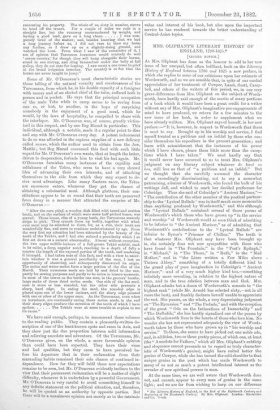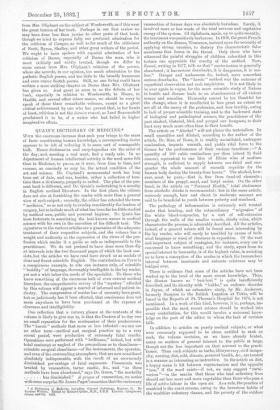MRS. OLIPHANT'S LITERARY HISTORY OF ENGLAND, 1790-1825.*
[SECOND NOTICE.]
As Mrs. Oliphant has done us the honour to add to her new issue of her unequal, but often brilliant, book on the Literary History of England between 1790 and 1825 a new preface, in which she replies to some of our criticisms upon her estimate of Wordsworth, and as we are sensible that, in spite of our cordial appreciation of her treatment of Cowper, Lamb, Scott, Camp- bell, and others of the writers of this period, we, in our very grave differences from Mrs. Oliphant on the subject of Words- worth, have hardly said enough of the merits of many portions of a book which it would have been a great credit for a writer without any of Mrs. Oliphant's imaginative pre-engagements of mind to have produced, we return for a few minutes to the new issue of her book, in order to supplement what we have already written. Mrs. Oliphant says of herself, in her new
preface It is, however, in respect to Wordsworth that there is most to say. Brought up in his worship and service, I find myself treated, as a publican and an infidel by those who con- sider themselves his expositors in the present generation ; and learn with astonishment that the instances of his power which I have chosen, please them little more than the excep- tions which I have taken." We need hardly say that it would never have occurred to us to treat tirs. Oliphant's judginent on any literary subject whatever de haut en bas, still less as that of "a publican and an infidel." But we thought that she carefully assumed the character of an exceedingly discriminating, not to say a somewhat patronising, admirer of Wordsworth, who found the bulk of his writings dull, and wished to mark her decided preference for Coleridge. Thus she said of Coleridge's "Ancient Mariner,"— " The contribution of the other member of the poetical partner- ship to the Lyrical Ballads' was in itself much more memorable than anything produced by Wordsworth," and this although the "Lyrical Ballads" contained several of those poems of Wordsworth's which those who have grown up "in the service and worship "of Wordsworth would as soon think of admitting to be inferior to "the Ancient Mariner," as of admitting that Wordsworth's contributions to the "Lyrical Ballads" are inferior to 13yron's "Prisoner of Chillon." The truth is that whatever Mm. Oliphant may have been brought up in, she certainly does not now sympathise with those who have found in "The Fountain," in the "Poet's Epitaph," in "Michael," in "The Thorn," in " Ruth," in the "Mad Mother," and in "the Lines written a Few Miles above Tintern Abbey," something of a totally different kind to the grand play of pure imagination in Coleridge's "Ancient Mariner,"—and of a very much higher kind too,—something infinitely more revealing, in relation to the highest nature of man, and to the true relation between man and God, Mrs. Oliphant admits but a dozen of Wordsworth's sonnets to "the highest rank" (while Mr. Arnold has selected sixty,—not in all cases the best), and frankly declares herself unable to appreciate the rest. She passes, on the whole, a very depreciating judgment on "The Excursion" and "The Prelude," and with the exception of the great " Ode on the Intimations of Immortality" and "The Daffodils," she has hardly signalised one of the poems by which Wordsworth lives in the hearts of those who love him. No wonder she has not represented adequately the view of Words- worth taken by those who have grown up in "his worship and service." To them, she seems to have picked out one noble ode, and, in addition, two or three pretty pieces, of which one, at least (the" Anecdote for Fathers," which all Mrs. Oliphant's subtlety and eloquence cannot persuade us to regard as truly character- istic of Wordsworth's genius), might have suited better the genius of Cowper, while she has turned the cold shoulder to that unique genius in the poet which has made Wordsworth to many of us not so much a potent intellectual interest as the revealer of new spiritual powers in man.
At the same time, we are well aware that Wordsworth does not, and cannot, appear to every man of genius in the same light ; and we are far from wishing to harp on our difference
* The Literary History of England, in the End of the Eighteenth Century and Beginning of the Nineteenth Cetutury. By Oliphant. London :Maomillan and Co. 3 vols.
from Mrs. Oliphant on the subject of Wordsworth, as if this were the great feature of her book. Perhaps in our first review we may have done less than justice to other parts of that book, 'though we tried to express fully our profound admiration for the criticism of Cowper, as well as for much of the criticisms of Scott, Byron, Shelley, and other great writers of the period. We ought to have spoken with especial admiration of her criticism of Burns, especially of Burns the man, who is most skilfully and subtly treated, though we differ to some extent from Mrs. Oliphant's criticism of the poems, -where she accords, in our opinion, too much admiration to the pathetic English poems, and too little to the broadly humorous and even coarse Scotch poems. Still, no one living could have written a more striking chapter on Burns than Mrs. Oliphant has given us. And great as seem to us the defects of her book, especially in relation to Wordsworth, to Moore, to Hazlitt, and several other minor names, we should be sorry to speak of these three remarkable volumes, except as a great critical achievement by one who has proved that, in her hands at least, criticism is not the dernier ressort, as Lord Beaconsfield proclaimed it to be, of a writer who had failed in higher imaginative efforts.


































 Previous page
Previous page